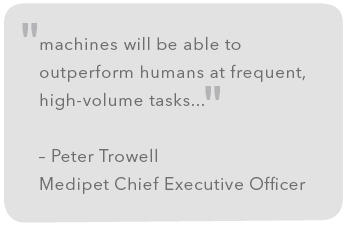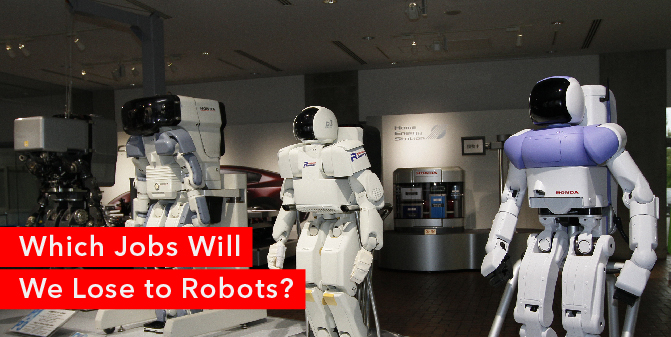Which Jobs Will We Lose to Robots?
It sounds like something your ancestors may have fretted about during the Industrial Revolution, but don’t be fooled: today, more than 200 years since humans began transitioning to machine-driven manufacturing processes, the threat of losing jobs to robots is more real than ever.
Welcome to the Internet of Things – where computers and machines can communicate with each other and complete intricate tasks without human intervention.
Which jobs are at highest risk?
According to Anthony Goldbloom in this video, machine learning is the most powerful branch of artificial intelligence (AI). It enables machines to learn from data and do some of the things humans can do – and not just basic things either. Even lawyers and doctors are at risk of being replaced by computers that are able to extrapolate information from hidden data and complete complex tasks without being expressly told where to look.
Goldbloom sites a 2013 Oxford University study that found that almost one in two jobs have a high risk of being automated by machines. He gives the examples of machines being able to mark exam papers or make medical diagnoses. The Washington Post also picked up on this study, which flagged logistical, administrative and transportation jobs among the most vulnerable.
 Given the right data, machines will be able to outperform humans at frequent,high-volume tasks. But where their limitations come in is in the fact that machines need to learn from large amounts of previous data, whereas humans do not. That means that jobs that are constantly throwing up challenges, and which require novel, out-of-the-box thinking – such as business strategy and marketing campaigns – won’t be dominated by the new wave of AI.
Given the right data, machines will be able to outperform humans at frequent,high-volume tasks. But where their limitations come in is in the fact that machines need to learn from large amounts of previous data, whereas humans do not. That means that jobs that are constantly throwing up challenges, and which require novel, out-of-the-box thinking – such as business strategy and marketing campaigns – won’t be dominated by the new wave of AI.
It’s time to skill up
It’s estimated that five million jobs will be taken over by robots by 2020 – pharmacists, astronauts, shop assistants, soldiers and even babysitters may find their jobs on the line. Workers who hold down highly-skilled or low-skilled roles face the least risk, which means mid-level jobs are the ones most likely to become computer-driven.
According to Digitaltrends.com, people will need to upskill in their roles if they want the best chance of retaining their positions – and not only because of technology innovations. Population growth and fewer job opportunities globally will mean that competition will be at an all-time high in the near future.
So, is it all doom and gloom? Not necessarily. In the video, Humans Need Not Apply, it’s said that, “Replacing human labour with mechanical muscles frees people to specialise, and that leaves everyone better off… This is how economies grow and standards of living rise.”
Watch the video for more insights into this fascinating topic, or peruse some of our other popular technology articles:
The Dark Side of the Internet of Things



